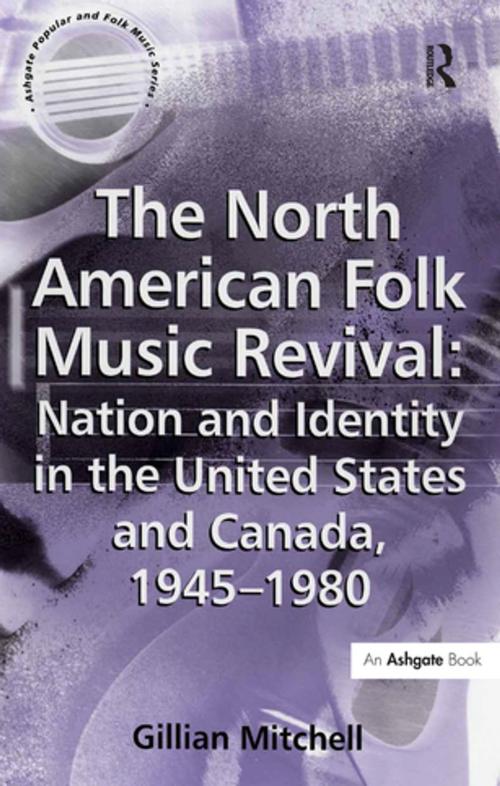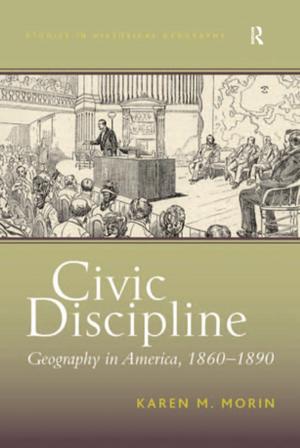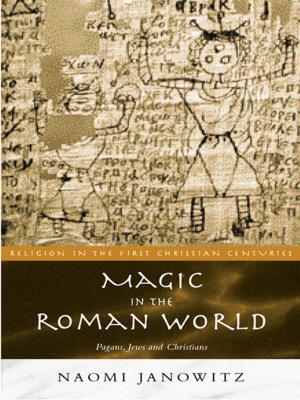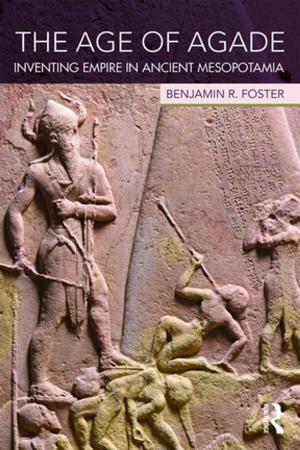The North American Folk Music Revival: Nation and Identity in the United States and Canada, 1945–1980
Nonfiction, Entertainment, Music, Music Styles, Folk & Traditional| Author: | Gillian Mitchell | ISBN: | 9781317022503 |
| Publisher: | Taylor and Francis | Publication: | February 17, 2016 |
| Imprint: | Routledge | Language: | English |
| Author: | Gillian Mitchell |
| ISBN: | 9781317022503 |
| Publisher: | Taylor and Francis |
| Publication: | February 17, 2016 |
| Imprint: | Routledge |
| Language: | English |
This work represents the first comparative study of the folk revival movement in Anglophone Canada and the United States and combines this with discussion of the way folk music intersected with, and was structured by, conceptions of national affinity and national identity. Based on original archival research carried out principally in Toronto, Washington and Ottawa, it is a thematic, rather than general, study of the movement which has been influenced by various academic disciplines, including history, musicology and folklore. Dr Gillian Mitchell begins with an introduction that provides vital context for the subject by tracing the development of the idea of 'the folk', folklore and folk music since the nineteenth century, and how that idea has been applied in the North American context, before going on to examine links forged by folksong collectors, artists and musicians between folk music and national identity during the early twentieth century. With the 'boom' of the revival in the early sixties came the ways in which the movement in both countries proudly promoted a vision of nation that was inclusive, pluralistic and eclectic. It was a vision which proved compatible with both Canada and America, enabling both countries to explore a diversity of music without exclusiveness or narrowness of focus. It was also closely linked to the idealism of the grassroots political movements of the early 1960s, such as integrationist civil rights, and the early student movement. After 1965 this inclusive vision of nation in folk music began to wane. While the celebrations of the Centennial in Canada led to a re-emphasis on the 'Canadianness' of Canadian folk music, the turbulent events in the United States led many ex-revivalists to turn away from politics and embrace new identities as introspective singer-songwriters. Many of those who remained interested in traditional folk music styles, such as Celtic or Klezmer music, tended to be very insular and conservative in their approach, rather than linking their chosen genre to a wider world of folk music; however, more recent attempts at 'fusion' or 'world' music suggest a return to the eclectic spirit of the 1960s folk revival. Thus, from 1945 to 1980, folk music in Canada and America experienced an evolving and complex relationship with the concepts of nation and national identity. Students will find the book useful as an introduction, not only to key themes in the folk revival, but also to concepts in the study of national identity and to topics in American and Canadian cultural history. Academic specialists will encounter an alternative perspective from the more general, broad approach offered by earlier histories of the folk revival movement.
This work represents the first comparative study of the folk revival movement in Anglophone Canada and the United States and combines this with discussion of the way folk music intersected with, and was structured by, conceptions of national affinity and national identity. Based on original archival research carried out principally in Toronto, Washington and Ottawa, it is a thematic, rather than general, study of the movement which has been influenced by various academic disciplines, including history, musicology and folklore. Dr Gillian Mitchell begins with an introduction that provides vital context for the subject by tracing the development of the idea of 'the folk', folklore and folk music since the nineteenth century, and how that idea has been applied in the North American context, before going on to examine links forged by folksong collectors, artists and musicians between folk music and national identity during the early twentieth century. With the 'boom' of the revival in the early sixties came the ways in which the movement in both countries proudly promoted a vision of nation that was inclusive, pluralistic and eclectic. It was a vision which proved compatible with both Canada and America, enabling both countries to explore a diversity of music without exclusiveness or narrowness of focus. It was also closely linked to the idealism of the grassroots political movements of the early 1960s, such as integrationist civil rights, and the early student movement. After 1965 this inclusive vision of nation in folk music began to wane. While the celebrations of the Centennial in Canada led to a re-emphasis on the 'Canadianness' of Canadian folk music, the turbulent events in the United States led many ex-revivalists to turn away from politics and embrace new identities as introspective singer-songwriters. Many of those who remained interested in traditional folk music styles, such as Celtic or Klezmer music, tended to be very insular and conservative in their approach, rather than linking their chosen genre to a wider world of folk music; however, more recent attempts at 'fusion' or 'world' music suggest a return to the eclectic spirit of the 1960s folk revival. Thus, from 1945 to 1980, folk music in Canada and America experienced an evolving and complex relationship with the concepts of nation and national identity. Students will find the book useful as an introduction, not only to key themes in the folk revival, but also to concepts in the study of national identity and to topics in American and Canadian cultural history. Academic specialists will encounter an alternative perspective from the more general, broad approach offered by earlier histories of the folk revival movement.















